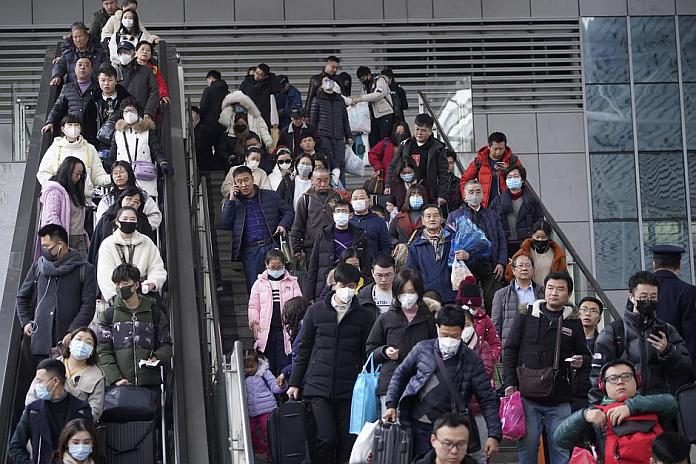By Se Young Lee, Lusha Zhang
BEIJING (Reuters) – The toll from the Wuhan coronavirus in China rose to six deaths on Tuesday and the first case was reported in the United States, sending markets tumbling on fears of economic damage as tourists canceled travel plans and airports stepped up screening.
The virus struck as millions of Chinese prepared to travel for the Lunar New Year, heightening contagion risks. Many in China scrambled to buy face masks to protect themselves from the previously unknown, flu-like infection.
The outbreak, which began in the central Chinese city of Wuhan, also worried financial markets as investors recalled China’s Severe Acute Respiratory Syndrome (SARS) epidemic in 2002-2003, a coronavirus outbreak that killed nearly 800 people.
“We’ll stay at home during the holiday. I’m scared as I remember SARS very well,” said Zhang Xinyuan, who had been bound from Beijing for the Thai resort of Phuket before she and her husband decided to cancel their air tickets.
A traveler from China was diagnosed in Seattle with the Wuhan coronavirus, the US Centers for Disease Control and Prevention (CDC) said, the first case identified in the United States. The patient was in good condition, the CDC said.
The agency said it expected to see more cases in the United States, had developed a new test to identify the virus and was in talks with the National Institutes of Health about developing a vaccine.
Authorities have confirmed more than 300 cases of the virus in China, mostly in Wuhan. Wuhan Mayor Zhou Xianwang told Chinese state television on Tuesday that six people had died in his city.
The disease is spreading around other parts of China, including five cases in capital Beijing. Cases have also been confirmed in Thailand, South Korea, Japan and Taiwan, all involving people who had been to Wuhan.
Fifteen medical personnel are among those infected. Symptoms include fever, coughing and difficulty breathing. The viral infection can cause pneumonia.
The World Health Organization (WHO) is set to hold a meeting on Wednesday to consider whether the outbreak is an international public health emergency.
“Information about newly reported infections suggest there may now be sustained human-to-human transmission,” said WHO’s regional director for the western Pacific, Takeshi Kasai.
North Korea is planning to temporarily ban foreign tourists, who are mainly Chinese, a foreign tour operator said. Though the origin of the virus has yet to be identified, WHO said the primary source was probably animal. Chinese officials have linked the outbreak to Wuhan’s seafood market.
The scare stirred risk aversion on global markets, with Asia particularly hit. Hong Kong, which suffered badly during the SARS outbreak, saw its index fall 2.8 percent. HSI. Japan’s Nikkei. N225 lost 0.9 percent and Shanghai blue chips. CSI300 fell 1.7 percent.
In Europe, shares of luxury goods makers were among those declining the most. Chinese shoppers account for most of the growth in the sector, and investors worried that health fears could deter Chinese consumers from traveling or shopping.
A US index of airline stocks fell 2.3 percent and hotel and casino operators Las Vegas Sands Corp (LVS.N) and Wynn Resorts Ltd (WYNN.O), both of which have large operations in China, dropped over 4 percent.
Shares of flu shot makers such as NanoViricides (NNVC.A) and Novavax (NVAX.O) soared. China’s yuan fell almost 0.7 percent in offshore trading to 6.9126 per dollar CNH=D3. Onshore, it dipped to its lowest in over a week at 6.9094 CNY=CFXS.
“The outbreak of a SARS-like coronavirus in Wuhan is developing into a major potential economic risk to the Asia-Pacific region now that there is medical evidence of human-to-human transmission,” said Rajiv Biswas, Asia Pacific chief economist for IHS Markit.
So far, the WHO has not recommended trade or travel restrictions, but they may be discussed on Wednesday. Airports in the United States, Australia and across Asia have begun extra screening for passengers from Wuhan.
In the city itself, officials have been using infrared thermometers to screen passengers at airports, railway stations and other passenger terminals since January 14. The Lunar New Year is a major holiday for Chinese, many of whom travel to join family or have a foreign vacation.
Long lines formed to buy face masks in cities. Some online vendors limited sales of masks and hand sanitizers as demand surged. Shanghai city’s market regulator warned it would punish speculators hoarding masks or other products used for preventing infectious diseases, according to the Shanghai Observer web publication.
Chinese travel booking platforms from Trip.com (TCOM.O) to Alibaba Group’s (BABA.N) Fliggy said they would offer free cancellations on bookings made for Wuhan, while South Korean budget airline T’way Air (091810.KS) postponed its launch of a new route to the city.





